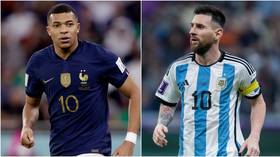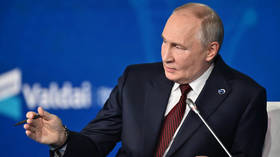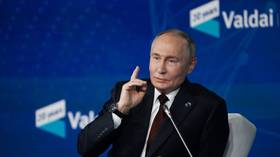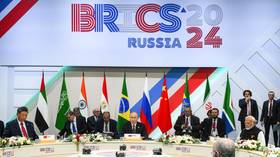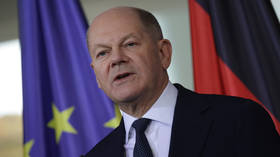The defending champions face a team led by an all-time great of the game
The curtain comes down on the 2022 FIFA World Cup this weekend when France take on Argentina at the Lusail Stadium in Qatar.
The game is the last of a 64-match tournament which has seen no shortage of excitement and its fair share of shocks.
The last two teams left standing are ones many would have picked as their favorites heading into the tournament.
Indeed, France versus Argentina is a game dripping with narrative: the defending champions aiming to make it back-to-back triumphs, against the South Americans led by a talisman desperate to capture the only major prize to have eluded him in an illustrious career.
It promises to be a blockbuster – here are the facts you need to know ahead of kick-off.
When and where is the World Cup final?
The 2022 FIFA World Cup final takes place on Sunday, December 18, at the Lusail Stadium. Kick-off is at 18:00 local time in Qatar.
The venue is located in Lusail City, around 20km north of central Doha. The capacity is listed by organizers as just under 89,000 – making it the largest stadium at the 2022 World Cup.
Sunday’s match will mark the end of the 22nd edition of the World Cup.
What is Argentina’s record in World Cup finals?
Argentina will be playing a sixth World Cup final in their history. They have won two and lost three of their past finals.
The first came at the maiden edition of the World Cup in 1930, when they lost 4-2 against hosts Uruguay in Montevideo.
La Albiceleste had to wait another 48 years for their next shot at World Cup glory. On that occasion they emerged victorious, beating the Netherlands 3-1 after extra time in the 1978 showpiece on home soil in Buenos Aires.
The nation didn’t have to wait too long for its second World Cup success as Diego Maradona inspired Argentina to glory in Mexico in 1986, when they defeated West Germany 3-2 in the final at the iconic Estadio Azteca.
Maradona and Co. ultimately fell short, suffering a 1-0 defeat in the final as the Germans exacted revenge at the Stadio Olimpico in Rome.
Argentina next featured in the biggest game in football when they reached the 2014 final in Brazil.
It was the Germans who again denied them, with an extra-time goal from Mario Gotze at the Maracana shattering the dreams of a team captained by Lionel Messi.
How have Argentina reached the 2022 World Cup final?
Argentina have gone all the way to the final in Qatar despite suffering a seismic shock in their opening game against Saudi Arabia.
Should they win on Sunday, Lionel Scaloni’s team will join Spain (2010) as the only teams ever to lose their opening World Cup match before going on to lift the trophy.
A 2-1 win against Australia followed, which was tighter than many expected.
Argentina then emerged from a rollercoaster quarterfinal against the Netherlands in which they squandered a two-goal lead late in the match before prevailing on penalties.
Things proved more straightforward in the semifinal against Croatia, as the South American champions earned a 3-0 win over the 2018 World Cup runners-up.
What is France’s record in World Cup finals?
France have appeared in the World Cup final on three previous occasions, walking away twice as victors.
Zidane turned from hero to villain eight years later, though, when he was sent off for headbutting Italy’s Marco Materazzi in the final at the Olympiastadion in Berlin, in what is still regarded as one of the most infamous red cards in football history.
France would go on to lose a penalty shootout to the Italians as Zidane signed off from his international career mired in controversy.
Moscow’s Luzhniki Stadium hosted France’s third World Cup final in 2018, as a packed crowd including Russian President Vladimir Putin saw a teenage Kylian Mbappe cement his place on football’s biggest stage as they powered past Croatia 4-2.
They would also move onto three World Cups in total – ahead of Argentina and Uruguay in the all-time stakes. In front of France would be only Germany and Italy on four, and Brazil on five. (Although the same will be true for Argentina if they win on Sunday.)
How have France reached the final in Qatar?
Much like their opponents on Sunday, France’s journey to the FIFA showpiece has not been without incident – and has come without a host of injured stars such as N’Golo Kante, Paul Pogba, and Karim Benzema, all of home have been absent from the squad.
But if that loss threatened to instill some insecurity in the French camp, any such fears were overcome in their first knockout game when they eased past Poland.
A sterner test awaited in the quarterfinals, but a missed Harry Kane penalty ensured that England once again wilted and France progressed as 2-1 winners.
The surprise packages of the World Cup, Morocco, awaited France in the semis, but there was to be no fairytale ending for the first-ever African team to play in the tournament’s last four, as France triumphed 2-0 to secure a spot in their second successive World Cup final.
Is this finally Messi’s time?
After disappointment in his appearances at four previous editions of the tournament, the stage is set for Messi to bow out from the World Cup on a high.
Qatar has already been a landmark tournament for Messi. He played his 1,000th career game during Argentina’s win against Australia, and has surpassed Gabriel Batistuta as his country’s top goalscorer at World Cups on 11 goals.
He will achieve yet another record on Sunday when he plays in his 26th World Cup game – one more than German legend Lothar Matthaus at the top of the all-time list.
Messi is tied with French rival and Paris Saint-Germain teammate Kylian Mbappe at the top of the Golden Boot charts in Qatar with five goals each, although Messi has contributed more assist, with three to Mbappe’s two.
Unlike Mbappe, Messi has suffered World Cup final pain before, when Argentina fell to Germany in 2014 – even though he left that tournament with the Golden Ball awarded to its best player.
What record do the two managers have?
Didier Deschamps, 54, is one of just three men to have won the World Cup as both a player and a manager (Mario Zagallo of Brazil and Franz Beckenbauer of Germany are the others), but will become the first of that trio to win it twice as a coach if France pip Argentina on Sunday.
Deschamps is also on the verge of being the only coach along with Italy’s Vittorio Pozzo (1934 and 1938) to win back-to-back World Cups, a record made even more remarkable by Deschamps captaining France to the trophy in 1998.
Not bad for a player once denigrated by Eric Cantona as a ‘water carrier’.
What is the teams’ head-to-head record?
Historically speaking, Argentina hold the edge in the head-to-head record between the two nations – but Sunday will be just the 13th time that the two teams have met, and only their fourth match in the past 35 years.
France came out on top in their last match at the 2018 World Cup when two goals from Kylian Mbappe helped his team to a 4-3 win against Messi and Argentina in their last 16 encounter at the Kazan Arena.
Overall, Argentina have won six matches against France, along with three losses and three draws. In the last five, Argentina have won three to France’s two.
Who is the referee for the big game?
Polish official Szymon Marciniak, 41, will take charge of the final in just his second World Cup as a referee – and both teams will be familiar as he has officiated them already in the tournament.
Marciniak oversaw France’s group stage win against Denmark, where he handed out a total of three yellow cards (and just one for France, to Jules Kounde).
He was also referee for Argentina’s win against Australia, where he issued just two yellow cards, both to the Socceroos.
Assisting Marciniak will be compatriots Pawel Sokolnicki and Tomasz Listkiewicz as linesmen, and fourth official Ismail Elfath of the US.
The designated VAR officials are Poland’s Tomasz Kwiatkowski, Venezuela’s Juan Soto, American Kyle Atkins, and Fernando Guerrero of Mexico.
Who will win the final?
This is one question we cannot answer definitively.
Argentina are slightly ahead in the official FIFA world rankings, placing third to France’s fourth – though various oddsmakers have tilted slightly towards France as the tournament reaches its final game.
As with any high-stakes game such as this, the sportsbooks are verging on so-called ‘pick’em’ territory when assessing each side’s chances.
There is a general impression amongst the bookies, it seems, that Argentina haven’t yet faced a side with the type of firepower at its disposal as Les Bleus.
France, though, struggled at times in what was their toughest test against England and were fortunate to avoid extra time after Harry Kane’s late penalty miss.
Deschamps’ team also found themselves under prolonged periods of pressure against Morocco, but again got the job done.
Olivier Giroud remains Mr. Reliable even at the age of 36, and has four goals thus far in Qatar – where he has broken the record as his country’s all-time top scorer. claimed , however, that Giroud might struggle to be fully fit for the final after picking up a knee injury, which could prompt a rethink for manager Deschamps.
For Argentina, Messi’s 22-year-old strike partner Julian Alvarez has been a sensation. The Manchester City player scored a double to sink Croatia, taking him to four goals for the tournament.
There are, however, various intangibles at play. Will Messi overcome a niggling hamstring issue to perform at his best in one of the biggest games of his career?
How potentially serious are the reports of a virus affecting preparations within the French camp, with defensive pair Raphael Varane and Ibrahima Konate the latest members of the squad to fall ill?
Will it be the master Messi who makes the difference, or his PSG apprentice Mbappe?
These questions are inching closer to being answered in Qatar on Sunday.
